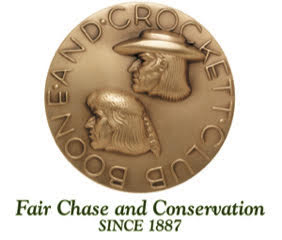Boone and Crockett Three Year Findings Give Insight to Trends in Big Game Health

MISSOULA, MT — According to the Boone and Crockett Club, in general, record-class specimens of native North American big game have become more common afield, based on newly compiled data by the Club’s records department. Conversely, records data reveal a stable or opposite trend for some species.
The Club recently compiled its records statistics for the period 2016-2018 in preparation for its triennial tribute to big game conservation and management – the 30th Big Game Awards, which will be held this August, in Springfield, Missouri. These data include two new World’s Records and an astounding 43 new state and provincial records.
“We studied the entries from last three years in 33 categories and compared these data going back 24 years over eight previous three-year recording periods,” said Justin Spring, the Club’s director of Big Game Records. “Overall our big game species are in great shape, either trending up or stable. We are confident in titling this event, North American Big Game; More and Healthier Than Ever, but there are still a few species we’re watching closely.”
Within the 2016-2018 record book entries, the condition of most big game species is considered stable with comparatively insignificant gains or losses compared to preceding recording periods. This list includes Alaska brown bear, bison, black and grizzly bear, cougar, mountain and woodland caribou, musk ox, non-typical Columbia and Sitka black-tailed deer, Coues’ whitetail, typical mule deer, and tule elk.
Significant uptrends in entries include:
Typical and non-typical white-tailed deer
Alaska-Yukon moose
Bighorn, desert bighorn, Dall’s, and Stone’s sheep
Non-typical American elk and Roosevelt’s elk
Non-typical mule deer
Pronghorn and Rocky Mountain goat
Noteworthy downtrends include:
Barren ground, Quebec-Labrador and Central Canada barren ground caribou
Canada and Shiras’ moose
Typical American elk
Typical Columbia blacktail
Spring said, “Three years ago we were paying close attention to musk ox, pronghorn, bighorn and Dall’s sheep, mountain and woodland caribou, and typical and non-typical mule deer, which have all made notable comebacks in recent years. We were most concerned with barren ground, Quebec-Labrador and Central Canada barren ground caribou and sadly still are. All have dropped even further in numbers of entries.”
Spring explained, “Antler and horn size in most species is directly linked to age and habitat quality, which is what makes these data valuable as a yardstick indicating how we are doing managing both game and their habitats. When entries are up or stable, that’s a sign that conditions on the landscape are good and mortality is low.”
Hunters led the restoration, conservation, and management practices that brought many big game species from vanishing to flourishing, and Spring expects our wildlife and science experts, with the support of sportsmen and others, to do the same for those species needing a helping hand today.
Bass Pro Shops and the Wonders of Wildlife National Museum & Aquarium are hosting the 30th Big Game Awards. The event features a public exhibition of the largest trophies from this three-year period, including a new World’s Record bighorn sheep and many of the new state and provincial records taken in the past three years. The exhibit is open to the public May 4 – August 3. Go to www.biggameawards.com for event details.
About the Boone and Crockett Club
Founded by Theodore Roosevelt in 1887, the Boone and Crockett Club is the oldest conservation organization in North America and helped to establish the principles of wildlife and habitat conservation, hunter ethics, as well as many of the institutions, expert agencies, science and funding mechanisms for conservation. Member accomplishments include enlarging and protecting Yellowstone and establishing Glacier and Denali national parks, founding the U.S. Forest Service, National Park Service and National Wildlife Refuge System, fostering the Pittman-Robertson and Lacey Acts, creating the Federal Duck Stamp program, and developing the cornerstones of modern game laws. The Boone and Crockett Club continues to be the leader in the hunter-conservationist community through its’ work in Conservation Policy, Conservation Education programs at major universities, Hunter Ethics, and Research, and collaboration with similarly focused organizations. The Club is headquartered in Missoula, Montana. For details, visit www.boone-crockett.org.






